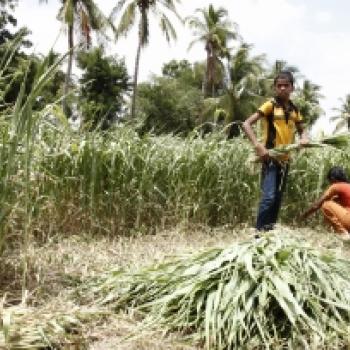
Earlier this week, Young Lives Research Associate Dr Ginny Morrow presented findings from 15 years of research exploring the changing nature of children's work in Ethiopia, India, Peru and Vietnam at a special learning event in London.
Young Lives has gathered data on how children spend their time – at school, work, rest and play. This data, set alongside qualitative research exploring experiences of work, has developed a rich picture of the shifting causes, conditions and consequences of children’s work.
By synthesizing this survey and qualitative data, Ginny described how children try to manage school alongside their working lives, how gender affects care and work responsibilities over childhood and adolescence, and how children themselves view the positive and negative aspects of their work.
Key findings highlighted that:
- Children's participation in paid work has declined in three out of our four of our study countries
- Children spend more time in school and less time in paid and unpaid work than previously
- Types of work are specific to context and shaped by gender, household composition and birth order
- Work may support skills development, and may enable children to go to school, but may interfere with schooling
- Social protection schemes affected children's time use.
The policy implications of these findings were explored alongside Dr Keetie Roelen (Institute of Development Studies), Jonathan Blagbrough (Children Unite) and Young Lives Director Professor Jo Boyden. An audio snapshot of the presentation is available here and blogs from panel contributors will be published on our website over the coming weeks.
Ginny's presentation is based on a report to be published in November to coincide with the fourth Global Conference on the Sustained Eradication of Child Labour in Buenos Aires, Argentina. The Conference will convene with the aim to consider progress on meeting Target 8.7 of Global Goals which focuses on child labour[1].
Ginny will also be presenting Young Lives findings at the International Forum in La Paz from October 16 to 21; ‘Public Policies with Working Children and Adolescents: Perspectives and Experiences from the Global South’. The Forum will facilitate a review of the practices and approaches of the work of protection and promotion of human rights with working children. For updates, follow #YLChildwork.
Frances Winter, Young Lives Policy Officer said:
‘The Sustainable Development Goals set ambitious targets on child labour, education, poverty and gender equality. Young Lives’ dataset provides policy-makers with unique insights into the way that children themselves are balancing their educational aspirations with work, play and family life, and the short and long-term consequences of work in childhood .
Against a background of complex trajectories across educational access, labour markets and poverty reduction, up-to-date evidence about patterns of children’s work, schooling and vulnerability is a vital foundation for sound policy-making. We are delighted to be able to share our research with you.

Earlier this week, Young Lives Research Associate Dr Ginny Morrow presented findings from 15 years of research exploring the changing nature of children's work in Ethiopia, India, Peru and Vietnam at a special learning event in London.
Young Lives has gathered data on how children spend their time – at school, work, rest and play. This data, set alongside qualitative research exploring experiences of work, has developed a rich picture of the shifting causes, conditions and consequences of children’s work.
By synthesizing this survey and qualitative data, Ginny described how children try to manage school alongside their working lives, how gender affects care and work responsibilities over childhood and adolescence, and how children themselves view the positive and negative aspects of their work.
Key findings highlighted that:
- Children's participation in paid work has declined in three out of our four of our study countries
- Children spend more time in school and less time in paid and unpaid work than previously
- Types of work are specific to context and shaped by gender, household composition and birth order
- Work may support skills development, and may enable children to go to school, but may interfere with schooling
- Social protection schemes affected children's time use.
The policy implications of these findings were explored alongside Dr Keetie Roelen (Institute of Development Studies), Jonathan Blagbrough (Children Unite) and Young Lives Director Professor Jo Boyden. An audio snapshot of the presentation is available here and blogs from panel contributors will be published on our website over the coming weeks.
Ginny's presentation is based on a report to be published in November to coincide with the fourth Global Conference on the Sustained Eradication of Child Labour in Buenos Aires, Argentina. The Conference will convene with the aim to consider progress on meeting Target 8.7 of Global Goals which focuses on child labour[1].
Ginny will also be presenting Young Lives findings at the International Forum in La Paz from October 16 to 21; ‘Public Policies with Working Children and Adolescents: Perspectives and Experiences from the Global South’. The Forum will facilitate a review of the practices and approaches of the work of protection and promotion of human rights with working children. For updates, follow #YLChildwork.
Frances Winter, Young Lives Policy Officer said:
‘The Sustainable Development Goals set ambitious targets on child labour, education, poverty and gender equality. Young Lives’ dataset provides policy-makers with unique insights into the way that children themselves are balancing their educational aspirations with work, play and family life, and the short and long-term consequences of work in childhood .
Against a background of complex trajectories across educational access, labour markets and poverty reduction, up-to-date evidence about patterns of children’s work, schooling and vulnerability is a vital foundation for sound policy-making. We are delighted to be able to share our research with you.

